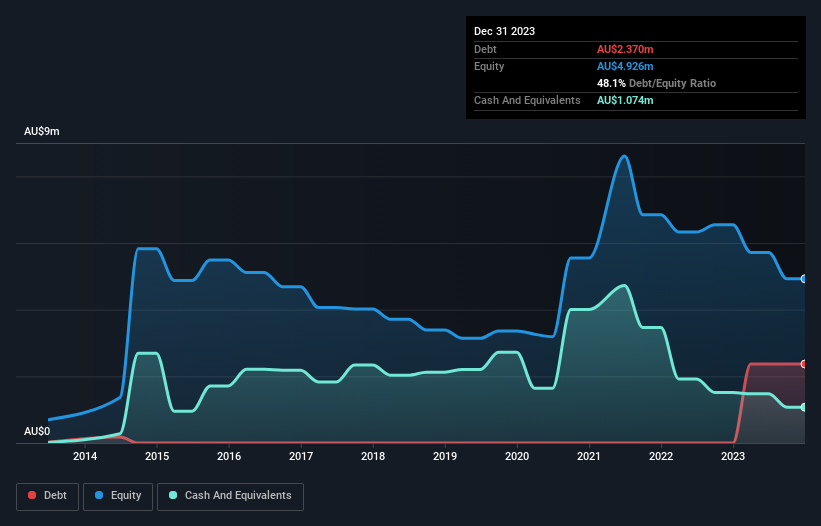
Some say volatility, rather than debt, is the best way to think about risk as an investor, but Warren Buffett famously said that 'Volatility is far from synonymous with risk.' So it seems the smart money knows that debt - which is usually involved in bankruptcies - is a very important factor, when you assess how risky a company is. Importantly, Motio Limited (ASX:MXO) does carry debt. But should shareholders be worried about its use of debt?
What Risk Does Debt Bring?
Generally speaking, debt only becomes a real problem when a company can't easily pay it off, either by raising capital or with its own cash flow. Part and parcel of capitalism is the process of 'creative destruction' where failed businesses are mercilessly liquidated by their bankers. However, a more frequent (but still costly) occurrence is where a company must issue shares at bargain-basement prices, permanently diluting shareholders, just to shore up its balance sheet. Of course, plenty of companies use debt to fund growth, without any negative consequences. The first step when considering a company's debt levels is to consider its cash and debt together.
Check out our latest analysis for Motio
What Is Motio's Debt?
The image below, which you can click on for greater detail, shows that at December 2023 Motio had debt of AU$2.37m, up from none in one year. However, it also had AU$1.07m in cash, and so its net debt is AU$1.30m.

How Healthy Is Motio's Balance Sheet?
Zooming in on the latest balance sheet data, we can see that Motio had liabilities of AU$1.51m due within 12 months and liabilities of AU$2.20m due beyond that. Offsetting these obligations, it had cash of AU$1.07m as well as receivables valued at AU$1.46m due within 12 months. So its liabilities outweigh the sum of its cash and (near-term) receivables by AU$1.17m.
Since publicly traded Motio shares are worth a total of AU$8.58m, it seems unlikely that this level of liabilities would be a major threat. However, we do think it is worth keeping an eye on its balance sheet strength, as it may change over time. There's no doubt that we learn most about debt from the balance sheet. But you can't view debt in total isolation; since Motio will need earnings to service that debt. So if you're keen to discover more about its earnings, it might be worth checking out this graph of its long term earnings trend.
In the last year Motio wasn't profitable at an EBIT level, but managed to grow its revenue by 36%, to AU$7.3m. With any luck the company will be able to grow its way to profitability.
Caveat Emptor
While we can certainly appreciate Motio's revenue growth, its earnings before interest and tax (EBIT) loss is not ideal. Indeed, it lost a very considerable AU$2.4m at the EBIT level. Considering that alongside the liabilities mentioned above does not give us much confidence that company should be using so much debt. Quite frankly we think the balance sheet is far from match-fit, although it could be improved with time. However, it doesn't help that it burned through AU$298k of cash over the last year. So suffice it to say we do consider the stock to be risky. There's no doubt that we learn most about debt from the balance sheet. But ultimately, every company can contain risks that exist outside of the balance sheet. For example, we've discovered 6 warning signs for Motio (4 are concerning!) that you should be aware of before investing here.
Of course, if you're the type of investor who prefers buying stocks without the burden of debt, then don't hesitate to discover our exclusive list of net cash growth stocks, today.
New: Manage All Your Stock Portfolios in One Place
We've created the ultimate portfolio companion for stock investors, and it's free.
• Connect an unlimited number of Portfolios and see your total in one currency
• Be alerted to new Warning Signs or Risks via email or mobile
• Track the Fair Value of your stocks
Have feedback on this article? Concerned about the content? Get in touch with us directly. Alternatively, email editorial-team (at) simplywallst.com.
This article by Simply Wall St is general in nature. We provide commentary based on historical data and analyst forecasts only using an unbiased methodology and our articles are not intended to be financial advice. It does not constitute a recommendation to buy or sell any stock, and does not take account of your objectives, or your financial situation. We aim to bring you long-term focused analysis driven by fundamental data. Note that our analysis may not factor in the latest price-sensitive company announcements or qualitative material. Simply Wall St has no position in any stocks mentioned.
About ASX:MXO
Motio
Operates as an audience experience and digital place-based media company in Australia.
Excellent balance sheet and good value.
Market Insights
Community Narratives


